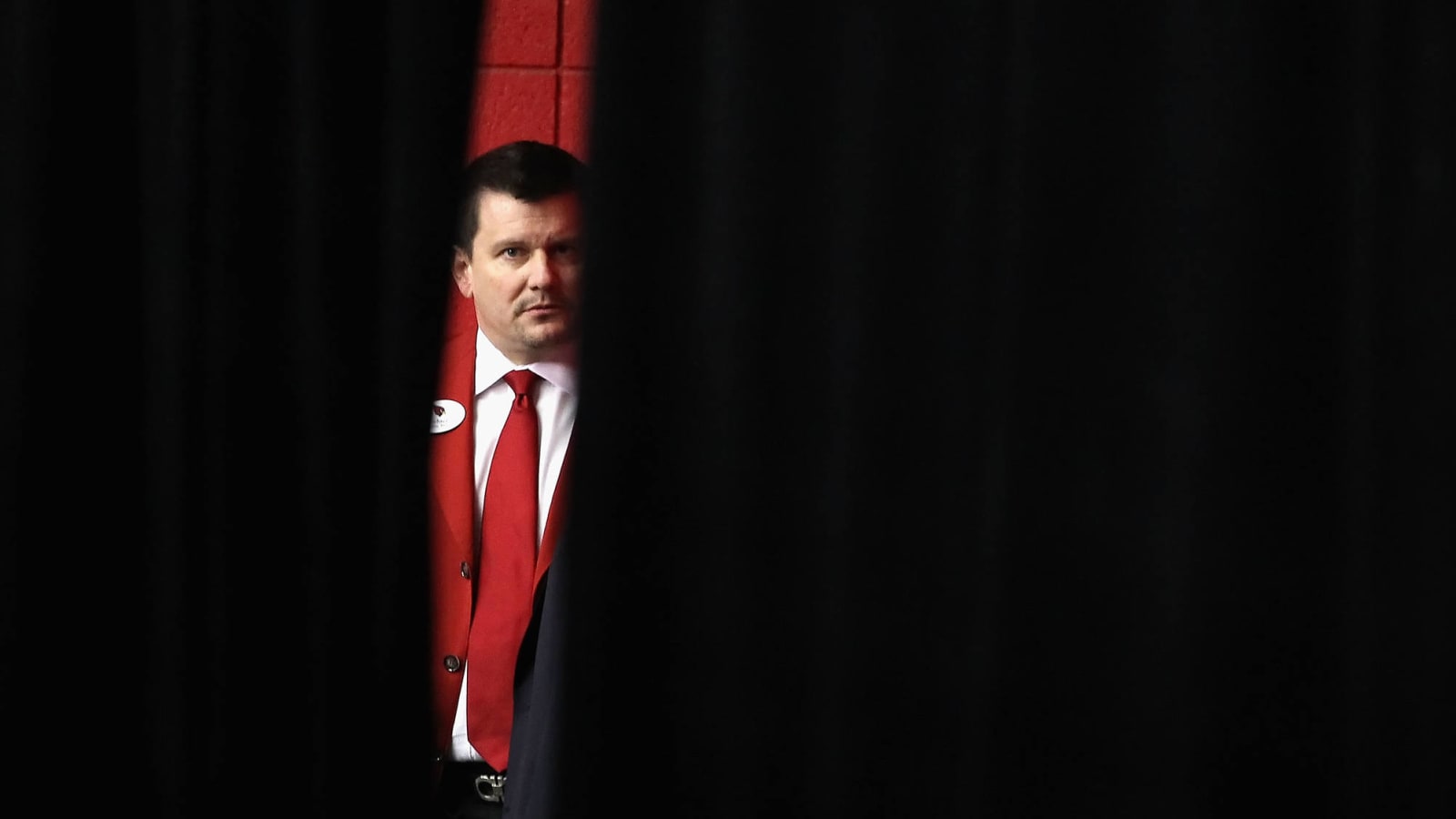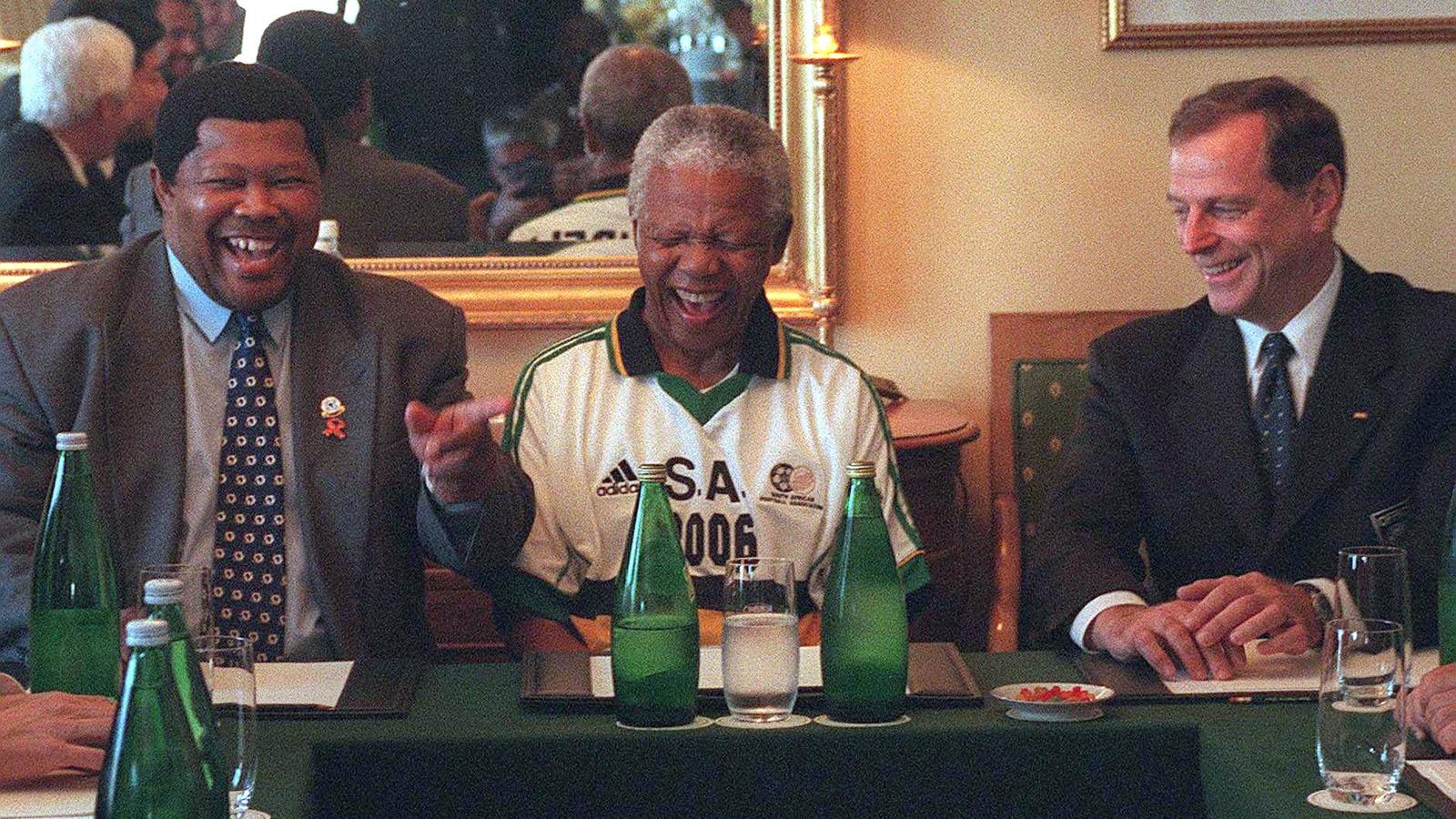
Sports & Politics Intersect: NFL owner denies double standard over who can talk about politics
"I’ve known Brett since I was 16 years old. We were high school football teammates. We’ve grown up in life together." - Michael Bidwill, Arizona Cardinals owner
On Monday, President Donald Trump announced that Brett Kavanaugh would be his pick to fill the Supreme Court vacancy left by Justice Anthony Kennedy. That same day, the Arizona Cardinals published an endorsement of the nomination on its website.
The press release notes that Kavanaugh and Michael Bidwill, the Cardinals' owner, went to private school together, and that the latter led an effort to get more than 130 former classmates to sign a letter endorsing the jurist. Among the signees was New York Yankees general manager Brian Cashman, who also attended the same private high school.
"He is a man of high character, high intelligence, excellence and independence," the letter seconded. "We want to speak up and show our support as former classmates and long-time friends.”
An NFL higher up endorsing a Supreme Court nominee isn't new — the Denver Broncos' John Elway did the same with Neil Gorsuch, who coincidentally went to the same private high school as Kavanaugh, Bidwill and Cashman.
That Bidwill used the professional team he owns as a platform to make a political statement in the midst of the NFL's still ongoing public relations nightmare that is the national anthem debate was not lost on a lot of people — a cursory Google search of Bidwill's name will yield articles like this one, this one, and this one calling him a hypocrite. For his part, Bidwill defended his actions during a conservative radio interview.
“People are saying stick to sports? You know what? We ask our players 20 days a year — game days — to restrict their statements," he argued without actually addressing the charges of duplicity. "The rest of the days, we want our players to get engaged in the community.”
So what should sports fans know about Kavanaugh?
For starters, that he's one of them. So much so, in fact, that Kavanaugh has repeatedly used sports analogies to explain his interpretation of the law and the Constitution. At a 2015 talk held in Chicago's Marquette University, for example, he used the infamous Dez Bryant catch to try to explain his views on the separation of powers as outlined in the Constitution. Similarly, in a 2010 dissenting opinion, Kavanaugh argued that SeaWorld shouldn't be held liable for its killer whales murdering its trainers.
“(The Department of Labor) cannot reasonably distinguish close contact with whales at SeaWorld from tackling in the NFL or speeding in NASCAR," Kavanaugh argued.
Sports fans should also note that Kavanaugh loves baseball, specifically the Washington Nationals. Like a lot — he reportedly racked up as much as $200,000 in debt for Nationals season tickets.
Need to know now:
MSU interim president to testify in front of Congress - In continuation of the investigation of Larry Nassar sexual abuse scandal, Michigan State University interim president John Engler will testify in front of a Senate subcommittee, the same panel his predecessor Lou Anna Simon spoke to before her departure. Separately, William Strampel, who is facing four criminal charges and a loss of his medical license for his role in the scandal, formally resigned from his post as dean of the university’s school for osteopathic medicine. MSU’s new compliance officer Nicholas Wittner says that he is not interested in protecting the school’s “brand,” and stated he has wide authority in this new role.
Another changing of the guard in due to Nassar scandal - The US Olympic Committee hired Sarah Hirschland this week, the first female permanent CEO of the organization.
Eighth former wrestler says Rep. Jordan knew of abuse - Another former Ohio State wrestler stepped forward with claims that Ohio congressman Jim Jordan knew of sexual abuse while he was an assistant coach with the team. Jordan’s denials continue to be tested, but he has the support of some of his colleagues on Capitol Hill, including Rep. Louie Gohmert, who used the adult status of the claimants (compared to the victims of Larry Nassar) in Jordan’s defense.
Papa John’s founder resigns as chairman of board - John Schnatter, who caught flak for blaming the NFL’s national anthem policy on declining sales for his Papa John’s franchise, resigned as chairman of the board after he reportedly used the n-word during a recent conference call in May — which was ironically about avoiding public gaffes. This new incident has crossed into college football; the University of Louisville announced on Friday they will remove the pizza chain’s name from Cardinal Stadium after several players said they don’t want to play in a stadium bearing Schattner or his company’s name and Senate Majority Leader Mitch McConnell endorsing the decision. (Safe to say they’ll be eating DiGiorno’s instead.)
NFLPA battling league over anthem policy - The NFL Players’ Association filed a grievance against the NFL over its controversial national anthem policy for the upcoming season, and while the group wants to open up discussions with the league over the new rules, it could have possibly been compelled by the aforementioned endorsement from Michael Bidwell.
How to finance Rays’ potential new home - The Tampa Bay Rays’ latest stadium proposal in Ybor City is as beautiful as it is expensive, with a translucent roof and a smaller seating bowl for a more intimate setting. That nearly $900 million price tag is an eyesore, however, and though Rays owner Stuart Sternberg says he wants a deal that benefits the Tampa region, the public isn’t so sure that will happen between taxpayer financing and the questionable economic benefits.
Macron will meet with Putin before World Cup final - In what seems to be a warm-up to the big summit between Donald Trump and Russian president Vladimir Putin, French president Emmanuel Macron with meet with the Russian leader at the World Cup final when his home country takes on Croatia.
Trump’s visit to golf course a challenge to his company brand - Speaking of the U.S president, he’ll be visiting Turnberry, Scotland to check out the golf resort he purchased in 2014, but locals are not expected to roll out the red carpet.
Pardoned ranchers ride home in style with Pence’s ally - Lucas Oil founder Forrest Lucas leaned on his friendship with Vice President Mike Pence to gain a pardon from President Trump for a father and son serving time in federal prison for arson of federal lands. The same Forrest Lucas whose company owns naming rights to the Indianapolis Colts’ home stadium and who gave the former Indiana governor tickets to the 49ers-Colts game where the veep would stage a walkout during the national anthem.
By and large, passionate sports fans lean right - While the intersect of sports and politics (ha!) are not as simple as aligning fandom with political parties, a study found in Public Opinion Quarterly found that intense sports fans tend to favor conservative policies, though spectator sports do attract fans across party lines.
Secrecy of a defensive coordinator’s identity is a matter of national security - Weeks away before the start of college football season, Air Force is without a defensive coordinator. Or is it? Maybe it has one, but we don’t know because the program has yet to announce who it is.
Would-be State Department employee is 2K League’s biggest star - Austin ‘Boo’ Painter had trained to work in the State Department, but when the NBA launched its 2K League, the allure of getting back into competitive gaming was too strong to ignore.
MLB bringing biometrics to ticketing - Major League Baseball has partnered with CLEAR to create biometric ticketing scanners at select ballparks letting fans use fingerprints in lieu of physical or mobile tickets. Some teams, like the New York Yankees, have been using CLEAR since 2015.
This week in sports and politics history: South Africa returns to FIFA-sanctioned soccer as apartheid ends

"[It’s] more than a game. It can create hope where there was once despair … this game made us feel alive." - Nelson Mandela on soccer
South Africa lost the 2006 bid to host the World Cup 11-12 because of a single abstaining vote. The country turned things around and proved that South Africa had the infrastructure and sponsors needed to host in 2010. However, there was a time in which it looked like South Africa would never play in a FIFA match again.
In 1964, the South African whites-only football association was suspended from FIFA, effectively keeping the country from competing in any international football matches because of the racist policies of the National Party. The National Party was an all-white government that installed a system of legislation called apartheid, which forced the wealthy, predominantly white minority to live in separate areas from the black majority. These laws were enacted in 1948 and lasted until 1991 when international and internal pressures forced South Africa to dismantle the laws and the regulations that made up apartheid.
With the repeal of apartheid, the whites-only rule for the national soccer team was also repealed, and South Africa was readmitted to FIFA on July 3, 1992. On July 7, they played their first FIFA-sanctioned game in nearly 30 years at Kings Park Stadium in Durban, besting Cameroon 1-0.
“We were kings that night. We’d not just beaten a Mickey Mouse team, but the Indomitable Lions of Africa, the World Cup quarterfinalists,” recalled Theophilus “Doctor” Khumalo, who scored the goal for Bafana Bafana.
Much like it is in many countries — even here in the United States — sports were a huge part of the national identity and played a part in racial politics. Nelson Mandela, who would become South Africa’s president after apartheid from 1994-1999, used rugby and soccer to help unify both sides of the country. Mandela was among those who helped contribute to South Africa’s winning World Cup bid in 2010.
More must-reads:
- MLB suspends grand slam promotion with Papa John’s after controversy
- Panthers announce sale to David Tepper is officially closed
- The 'Active MLB strikeout leaders' quiz
Breaking News
Customize Your Newsletter
 +
+
Get the latest news and rumors, customized to your favorite sports and teams. Emailed daily. Always free!

